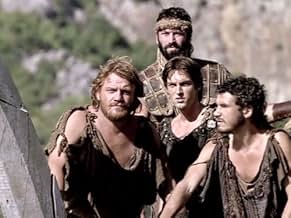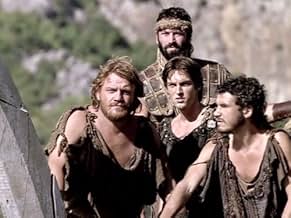PUNTUACIÓN EN IMDb
5,9/10
5,7 mil
TU PUNTUACIÓN
Una de las aventuras más legendarias de toda la mitología cobra vida en una saga épica sobre la búsqueda de un hombre por el Toisón de Oro, un regalo de los dioses.Una de las aventuras más legendarias de toda la mitología cobra vida en una saga épica sobre la búsqueda de un hombre por el Toisón de Oro, un regalo de los dioses.Una de las aventuras más legendarias de toda la mitología cobra vida en una saga épica sobre la búsqueda de un hombre por el Toisón de Oro, un regalo de los dioses.
- Nominado para 2 premios Primetime Emmy
- 10 nominaciones en total
Explorar episodios
Argumento
¿Sabías que...?
- CuriosidadesColchis, the location of the Golden Fleece, is an actual place on the eastern coast of the Black Sea, western Georgia.
- ConexionesVersion of Jasón y los argonautas (1963)
Reseña destacada
Being an unconditional admirer of Ray Harryhausen's and Don Chaffey's version of `Jason and the Argonauts' could be a disadvantage to fully enjoy this Hallmark mini-series. But surprisingly it has its own values to make it an enjoyable experience.
First I'd like to claim that I see no reason to diminish its merits because of its faithfulness or liberties regarding Greek mythology. This is cinema not literature, and it must be evaluated as a work of moving images. If judging a cinematic work according to literary precepts were the rule, then not even the 1963 film would endure this kind of judgment: as I remember it, Medea, for instance, was described as a high priestess not related to the royal family of Colchis. According to the faithful-to-literary-source approach, that would be enough to condemn the motion picture. On the other hand, I believe that `Jason 2000' was also inspired by cinematic tradition, not only by the 1963 production but other sources as well, as Marcel Camus' `Orfeu negro', and today's horror films. It was also inspired by our times: the reason to include a female Argonaut validates the role of women warriors, instead of being a feminist or `politically correct' concession.
One of the most interesting things about this version is its casting, resulting in the fact that the story is told from the point of view of very young people, with all their impetus and fragility. When most contemporary motion pictures portray aimless young persons, this series shows a purposeful youth, young people with a mission and who fulfill their destiny with passion. Such is the case of Jason, Medea, Acastus, Atalanta, Aspyrtes, Orpheus, Zetes, and most of the Argonauts. These are the real protagonists of the story. In their search for justice and love, they are helped or betrayed by their elders, be it gods (Zeus, Poseidon, and Hera who appears three times as an old peasant woman) or humans (Pelias, Aertes, Phineas).
It is inevitable to compare the film to its predecessor: concerning the gods, this time they seem more lustful and primitive than the Olympus portrayed in the 1963 film, with Nial McGinnis and Honor Blackman fighting over Jason's destiny. This time Hera and Zeus feel unequivocal sexual attraction towards Jason and Medea, respectively. Hera makes reference to Zeus' frolicking with humans, and that may please the Greek mythology purists. But their representations seem out of a detergent TV spot -clouds included- and the acting by Olivia Williams and, specially, by Angus MacFadyen do not help much. At least, in the original the naiveté of the gods seemed more apt to the story being told, than these two creatures who open the narration in awe, but close it with embarrassingly sexy foreplay.
Special effects are fine, but in some respects they do not surpass the Harryhausen creatures. A mechanic bull sound effects included- substitutes Talos, but the titan is evoked by the imposing height of a Poseidon out of `The Neverending Story'. The sequences of the dragon, the skeleton army and the harpies do not improve on the original ones. Compared to the seven-headed hydra, this dragon is rather silly (it falls awkwardly into a precipice that it has previously climbed with ease). The skeletons this time looking like mannequins grounded on earth- lack the grace of the mean originals. In spite of the work of the Jim Henson workshop, the whole harpies sequence lacks the dark and exciting atmosphere created by Harryhausen, Chaffey and Herrmann.
In this version, there are more exciting warring scenes and Jason finally claims his throne, but to make the story work for three hours the film is full of melodramatic gestures and dialogues, which alternate with the action. The writers added some `character development' with Freudian overtones taken from a Psychology 101 course, that give a little depth to the characters: it may work for Pelias, Polymele or Medea, but in the case of Jason, being an action hero, his uncertainty and doubts tend to diminish the empathy with the viewer. In other occasions, they are too tame or just do not make sense: did Aspyrtes have an incestuous relationship with Medea, or is he gay and jealous of Medea because of Jason? In this respect, direction of actors is very suggestive in many different scenes.
All this said, I think that the film has the same enthusiasm of the original; the search for the golden fleece is still fascinating no matter how much Greek mythology has been altered. In the final analysis, `Jason 2000' is an enjoyable mini-series, with a story of tyranny, greed and righteousness still relevant for our times.
First I'd like to claim that I see no reason to diminish its merits because of its faithfulness or liberties regarding Greek mythology. This is cinema not literature, and it must be evaluated as a work of moving images. If judging a cinematic work according to literary precepts were the rule, then not even the 1963 film would endure this kind of judgment: as I remember it, Medea, for instance, was described as a high priestess not related to the royal family of Colchis. According to the faithful-to-literary-source approach, that would be enough to condemn the motion picture. On the other hand, I believe that `Jason 2000' was also inspired by cinematic tradition, not only by the 1963 production but other sources as well, as Marcel Camus' `Orfeu negro', and today's horror films. It was also inspired by our times: the reason to include a female Argonaut validates the role of women warriors, instead of being a feminist or `politically correct' concession.
One of the most interesting things about this version is its casting, resulting in the fact that the story is told from the point of view of very young people, with all their impetus and fragility. When most contemporary motion pictures portray aimless young persons, this series shows a purposeful youth, young people with a mission and who fulfill their destiny with passion. Such is the case of Jason, Medea, Acastus, Atalanta, Aspyrtes, Orpheus, Zetes, and most of the Argonauts. These are the real protagonists of the story. In their search for justice and love, they are helped or betrayed by their elders, be it gods (Zeus, Poseidon, and Hera who appears three times as an old peasant woman) or humans (Pelias, Aertes, Phineas).
It is inevitable to compare the film to its predecessor: concerning the gods, this time they seem more lustful and primitive than the Olympus portrayed in the 1963 film, with Nial McGinnis and Honor Blackman fighting over Jason's destiny. This time Hera and Zeus feel unequivocal sexual attraction towards Jason and Medea, respectively. Hera makes reference to Zeus' frolicking with humans, and that may please the Greek mythology purists. But their representations seem out of a detergent TV spot -clouds included- and the acting by Olivia Williams and, specially, by Angus MacFadyen do not help much. At least, in the original the naiveté of the gods seemed more apt to the story being told, than these two creatures who open the narration in awe, but close it with embarrassingly sexy foreplay.
Special effects are fine, but in some respects they do not surpass the Harryhausen creatures. A mechanic bull sound effects included- substitutes Talos, but the titan is evoked by the imposing height of a Poseidon out of `The Neverending Story'. The sequences of the dragon, the skeleton army and the harpies do not improve on the original ones. Compared to the seven-headed hydra, this dragon is rather silly (it falls awkwardly into a precipice that it has previously climbed with ease). The skeletons this time looking like mannequins grounded on earth- lack the grace of the mean originals. In spite of the work of the Jim Henson workshop, the whole harpies sequence lacks the dark and exciting atmosphere created by Harryhausen, Chaffey and Herrmann.
In this version, there are more exciting warring scenes and Jason finally claims his throne, but to make the story work for three hours the film is full of melodramatic gestures and dialogues, which alternate with the action. The writers added some `character development' with Freudian overtones taken from a Psychology 101 course, that give a little depth to the characters: it may work for Pelias, Polymele or Medea, but in the case of Jason, being an action hero, his uncertainty and doubts tend to diminish the empathy with the viewer. In other occasions, they are too tame or just do not make sense: did Aspyrtes have an incestuous relationship with Medea, or is he gay and jealous of Medea because of Jason? In this respect, direction of actors is very suggestive in many different scenes.
All this said, I think that the film has the same enthusiasm of the original; the search for the golden fleece is still fascinating no matter how much Greek mythology has been altered. In the final analysis, `Jason 2000' is an enjoyable mini-series, with a story of tyranny, greed and righteousness still relevant for our times.
- EdgarST
- 28 feb 2001
- Enlace permanente
Selecciones populares
Inicia sesión para calificar y añadir a tu lista para recibir recomendaciones personalizadas
Detalles
- Fecha de lanzamiento
- Países de origen
- Idioma
- Títulos en diferentes países
- Jasón y los Argonautas en busca del Vellocino de Oro
- Localizaciones del rodaje
- Empresas productoras
- Ver más compañías en los créditos en IMDbPro
Contribuir a esta página
Sugerir un cambio o añadir el contenido que falta

Principal laguna de datos
By what name was Jasón y los argonautas (2000) officially released in India in English?
Responde






































